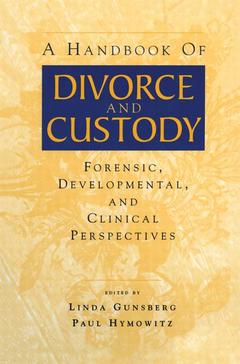Description
A Handbook of Divorce and Custody
Forensic, Developmental, and Clinical Perspectives
Coordinators: Gunsberg Linda, Hymowitz Paul
Language: English
Subject for A Handbook of Divorce and Custody:
Keywords
mental; health; profession; evaluations; custodial; parent; supervised; visitation; guardian; litem; Parental Alienation Syndrome; Linda Gunsberg; Child Custody Evaluations; Violated; Extracurricular; Disengaged; Guardian Ad Litem; Joint Custody; Custody Evaluations; Nonresidential Parent; Thematic Apperception Test; Noncustodial Parent; Soul Blindness; Forensic Evaluator; Custodial Parent; Chronic; Wo; Custody Disputes; Forensic Evaluation; Sole Custody; Follow; Supervised Visitation; Custody Litigation; Forensic Expert; Young Man
Publication date: 05-2013
Support: Print on demand
Publication date: 02-2005
456 p. · 15.2x22.9 cm
Description
/li>Contents
/li>Readership
/li>Biography
/li>
The Handbook of Divorce and Custody brings together mental health professionals and forensic specialists dedicated to working in the legal arena with families in crisis. Section I provides the individual perspectives of experienced clinicians, all of whom share a psychodynamic and developmental purview, and supplements their accounts with the viewpoints of a lawyer and a judge. Section II examines parental psychopathology, which is often at the root of family conflict and turmoil. Section III deals with the nature and extent of the state's potential involvement with the family, from ensuring parents' rights to raise their children to identifying those circumstances that justify the termination of parental rights. The remaining three sections follow the progressive issues engaged by divorcing families as they work their way through the legal system: forensic evaluation, post-divorce legal arrangements, and the emotional aftermath of divorce, including indications for various types of therapeutic intervention.
Through the Handbook, contributors pay special attention to a set of core issues that underlie - and complicate - the evaluations, recommendations, and judicial determinations that enter into the divorce/custody process. Specifically, they focus on the inherent conflict between the family's right to privacy and the state's commitment to the best interest of children; the increasingly uncertain question of what constitutes a family and who has the right to legal standing; the problematic role of fathers in the lives of their children; the nature of the evaluation process and the role of the forensic expert in a "good enough" evaluation; the important differences between the role of therapist and the role of evaluator; and, finally, the impact of divorce itself on the lives of today's children.
Part I: The Courtroom: A Multidisciplinary Collaboration.Gunsberg, Interlude I. Tumas, What Judges Want (and Children Dream). Dobrish, A Lawyer's Considerations in Selecting a Mental Health Expert. Grant, Klee, Representation of the Child to the Court: The Law Guardian and Guardian ad Litem. Schaul, Considering Custody Evaluations: The Thrills and the Chills. Wulach, Shapiro, Ethical and Legal Considerations in Child Custody Evaluations. Part II: Parental Psychopathology and Its Impact on the Child.Hymowitz, Interlude II. Siegler, Home Is Where the Hurt Is: Developmental Consequences of Domestic Conflict and Violence on Children and Adolescents. Novick, Novick, Soul Blindness: A Child Must Be Seen to Be Heard. Gunsberg, Betrayal of the Family: The Parental Affair as Family Incest. Shopper, Parental Alienation: The Creation of a False Reality. Part III: Parents' Rights and Responsibilities.Hymowitz, Interlude III. Guggenheim, When Should Courts Be Empowered to Make Child-Rearing Decisions? Solnit, Nordhaus, Divorce and Custody in a Changing Society. Klein, The Rights of Parents and Stepparents: Toward a Redefinition of Parental Rights and Obligations. Silverman, When the State Has Custody: The Fragile Bond of Mothers and Their Infants on the Prison Nursery. Galietta, When Families Cannot Be Healed: The Limits of Parental Rights. Part IV: The Forensic Expert's Challenge: Making Recommendations in the Best Interests of Children.Gunsberg, Interlude IV. Gunsberg, The Developmental Evolution of the Family Forensic Evaluation. Bricklin, Elliot, Empirically Assisted Assessment of Family Systems. Schwager, Parents' Sensitivity to the Child's Creative and Spiritual Core: An Overlooked Consideration in Child Custody Determinations. Cling, Evaluation of Allegations of Child Sexual Abuse in Child Custody Disputes. Part V: The Dilemma of Visitation.Hymowitz, Interlude V. Dember, Fliman, Tailoring Parental Visitation Orders to the Developmental Needs of Children of Divorce. Solomon, An Attachment Theory Framework for Planning Infant and Toddler Visitation Arrangements in Never-Married, Separated, and Divorced Families. Hauser, Visitation in High-Conflict Families: The Impact on a Child's Inner Life. Tuckman, Supervised Visitation: Preserving the Rights of Children and Their Parents. Hymowitz, Relocation: Parents' Needs, Children's Interests. Part VI: Aftermath and Healing.Gunsberg, Interlude VI. Tessman, Experiencing the Absent Father: In Sight and Inside. Siskind, Psychotherapy with Children and Parents During Divorce. Johnston, Clinical Work with Parents in Entrenched Custody Disputes. Wallerstein, Resnikoff, Parental Divorce and Developmental Progression: An Inquiry into Their Relationship. Gunsberg, Epilogue.
Linda Gunsberg, Ph.D., is Chair, Family Forensics Training Program, Washington Square Institute for Psychotherapy and Mental Health, New York, and Co-chair, Psychoanalysis and the Law Discussion Group, American Psychoanalytic Association.
Paul Hymowitz, Ph.D., is Clinical Assistant Professor of Psychiatry, New York Medical College, and Co-chair, Interdisciplinary Forum on Mental Health and Family Law.
These books may interest you

Handbook of Child Custody 263.74 €



